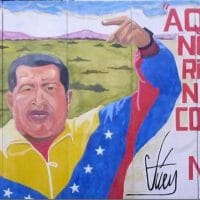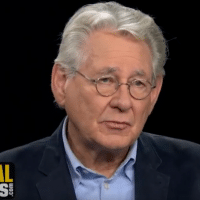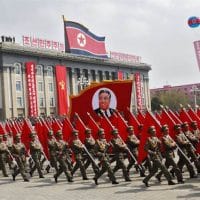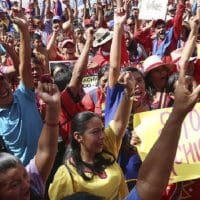-
Communes and workers’ control in Venezuela
To discuss the Venezuelan communes and the new forms of participation, as well as its successes, difficulties and contradictions, Investig’Action interviewed Dario Azzellini.
-
May Day 2018: Exploitation, NO! Expropriation, NO! Unite for justice!
In view of the historic May Day, May 1st, analysts from Monthly Review, the famous independent socialist magazine, identify tasks the working classes should press with. The following interviews were conducted in early April with John Bellamy Foster, Professor and Editor of Monthly Review; Fred Magdoff, Professor Emeritus, and one of Monthly Review’s closest associates; […]
-
Dossier 3: Syria’s bloody and unforgiving war
Syria enters its eighth year of a bloody and unforgiving war. The death toll is catastrophic. After the number reached 200,000, the United Nations stopped keeping count.
-
Socialists are urgently looking for the future: American Marxist Mike Davis talks to Algerian journalist Mohsen Abdelmoumen
The Algerian journalist Mohsen Abdelmoumen interviewed Mike Davis recently. This is a fascinating interview that ranges from the question of Marxism today to the politics of Middle East to the necessity of socialism.
-
Aijaz Ahmad on Syria, U.S. and Palestine
A rational solution is possible for Syria, if the US wants to be rational. But with Kushner in the White House Palestine faces a grim future.
-
Interview with Joseph Halevi
Joseph Halevi was born in 1946 in Haifa, which then was part of British Palestine but since 1948 in Israel. Most of his earlier life was spent in Rome, where he graduated in Philosophy and Political Economy. He has been Professor of Economics at the Interna-ional University College Turin, Italy, since 2010.
-
Who will stop the U.S.-Russia arms race?
President Trump is drawing heat for congratulating Russian President Vladimir Putin on his re-election victory. During a phone call with Putin this week Trump reportedly ignored a written directive from his aides that instructed him, quote, do not congratulate. Speaking to MSNBC, Democratic Sen. Mark Warner echoed the outraged response from Republican Sen. John McCain.
-
Is another world possible?
On Reality Asserts Itself, Prof. Leo Panitch says it’s a dilemma that the gradualism of European social-democracy and attempts at a more radical transformation have so far both failed; Panitch says a first step towards democratizing the economy is to make finance a public utility – with host Paul Jay
-
Roxanne Dunbar-Ortiz, Loaded & Gregg Levine on Fukushima Daichi radiation
Roxanne Dunbar-Ortiz tells us about her new book, Loaded: A Disarming History of the Second Amendment.
Then we talk with journalist Gregg Levine about his special investigation for The Nation Magazine into the deaths and illnesses afflicting U.S. sailors exposed to radiation from the Fukushima Daichi meltdown. It’s titled “Seven Years on, Sailors Exposed to Fukushima Radiation Seek Their Day in Court.”
-
The U.S. can’t revive the Monroe Doctrine or expel China from Latin America, but it can inflict pain on the region
In this MPN exclusive, we speak to Monthly Review editor John Bellamy Foster and Latin America studies scholar Harry L. Simón Salazar about the U.S. fight to maintain hegemony in Latin America, the rise of the right wing, and the danger of “regime change” in Venezuela.
-
Finding ways to be one: The making of Cedric J. Robinson’s radical Black politics.
Historian Robin D.G. Kelley explores the radical Black politics of scholar Cedric J. Robinson—from his historical understanding of race and capitalism as inherently inseparable systems, to his vision of the possibilities of politics, rooted deep in struggles past and present.
-
From Marx Reloaded to Marx Returns
You made Marx Reloaded in 2011, after the financial crisis and a return of Marx in particular and of the critique of capitalism in general. What do you think today, 10 years after the crisis, is the outcome of this return?
-
North Korea is more rational than you think: An interview with Bruce Cumings
With the Olympic Winter Games right around the corner, tension on the Korean Peninsula is again the focal point of international affairs. After months of increasing provocation between North Korean leader Kim Jong-un and U.S. President Donald Trump — highlighted by missile tests and sabre-rattling on both sides — signs of a rapprochement are emerging.
-
‘You can’t watchdog government if government’s watching all your communication’
“Congress Advances Bill to Renew NSA Surveillance Program After Trump Briefly Upstages Key Vote” was the headline on a Washington Post article. The lead described the bill as reauthorizing “the government’s authority to conduct foreign surveillance on U.S. soil.”
-
Bill Fletcher Jr. on Black Marxism
Veteran labor activist Bill Fletcher jr. talks about how capitalism is based on the slave trade and colonialism, the Black contribution to Marxism, and the need to organize.
-
Mainstream media and imperial power
Noted journalist and filmmaker John Pilger’s collection of work has been archived by the British Library, but deep-rooted problems of Western media create an increasingly difficult landscape for ethical journalism, as Pilger explained in an interview with Dennis Bernstein and Randy Credico.
-
Leading Marxist scholar David Harvey on Trump
For the past year,, we have all experienced an intense sort of political vertigo. Of course, part of this is due to the fact that Donald Trump is president and constantly scoops the story of the latest outrage about himself by performing yet another outrage just as we start discussing the previous one.
-
Lula, Brazil elections and the left
In an exclusive interview with teleSUR, Brazilian professor and researcher Sabrina Fernandes discusses former President Luiz Inacio “Lula” da Silva’s Jan. 24 corruption trial and forthcoming elections in the South American country.
-
‘Socialism a necessity for human survival’
According to John Bellamy Foster, the world environmental crisis is a systemic crisis, a product of capitalism, and requires systemic changes in the capitalist system. He says that environmental sustainability is incompatible with capitalism.
-
“The seeds of revolt are present in many places”
Interview with John Bellamy Foster, Editor of Monthly Review. By JIPSON JOHN and JITHEESH P.M.




















